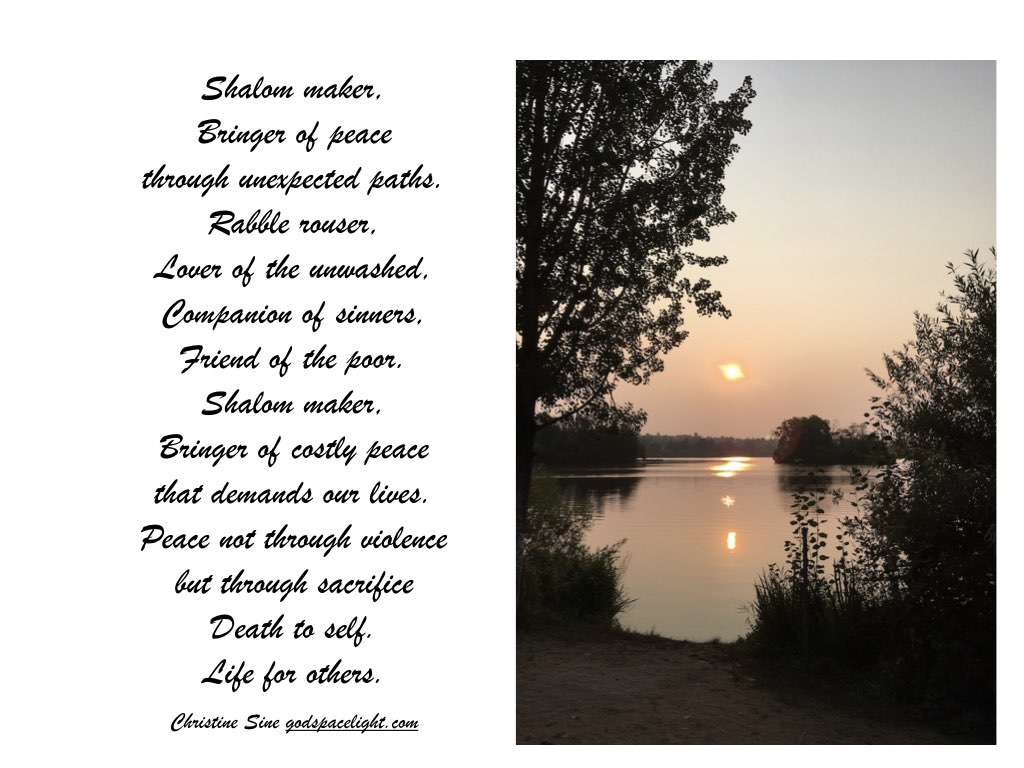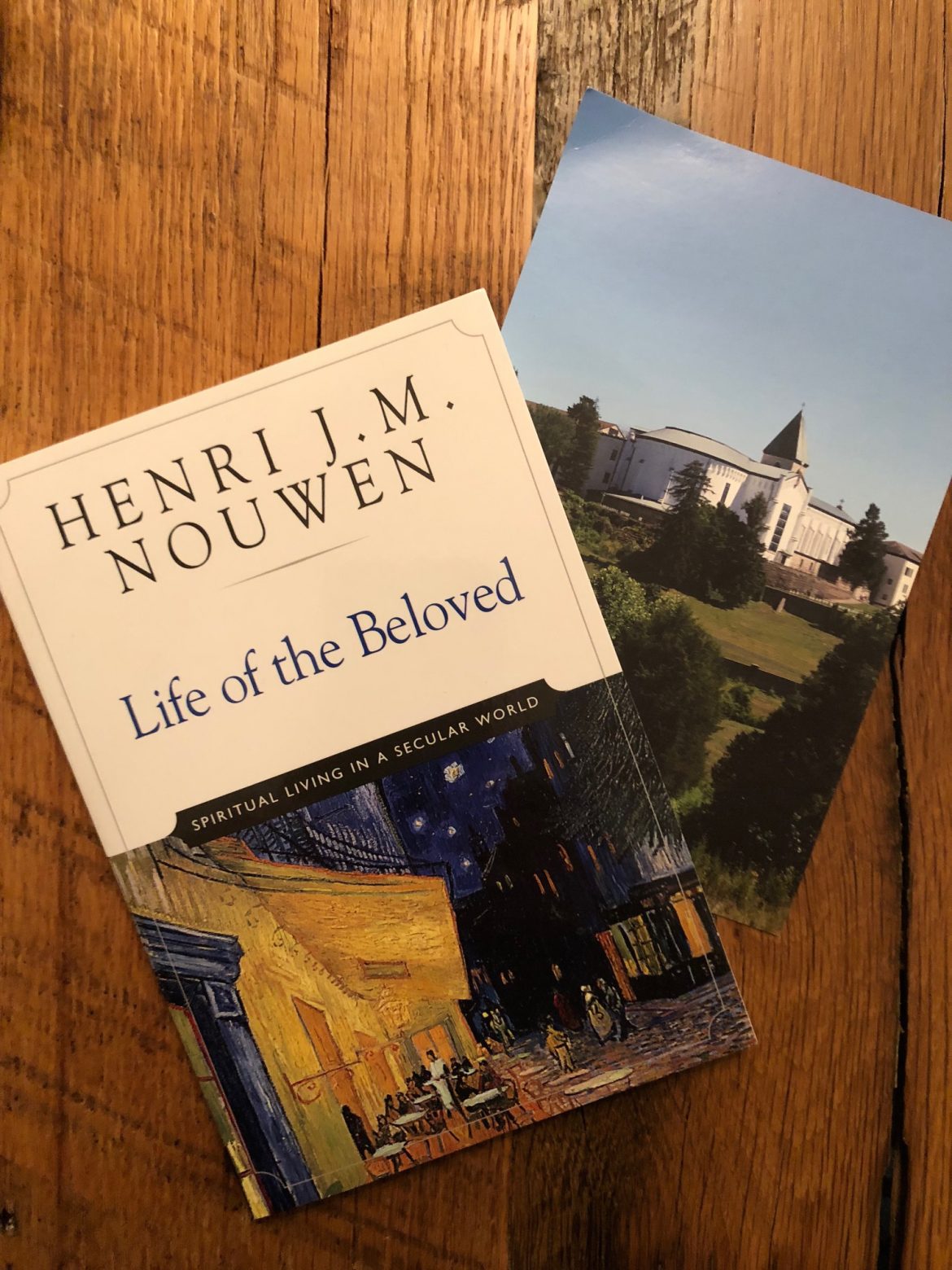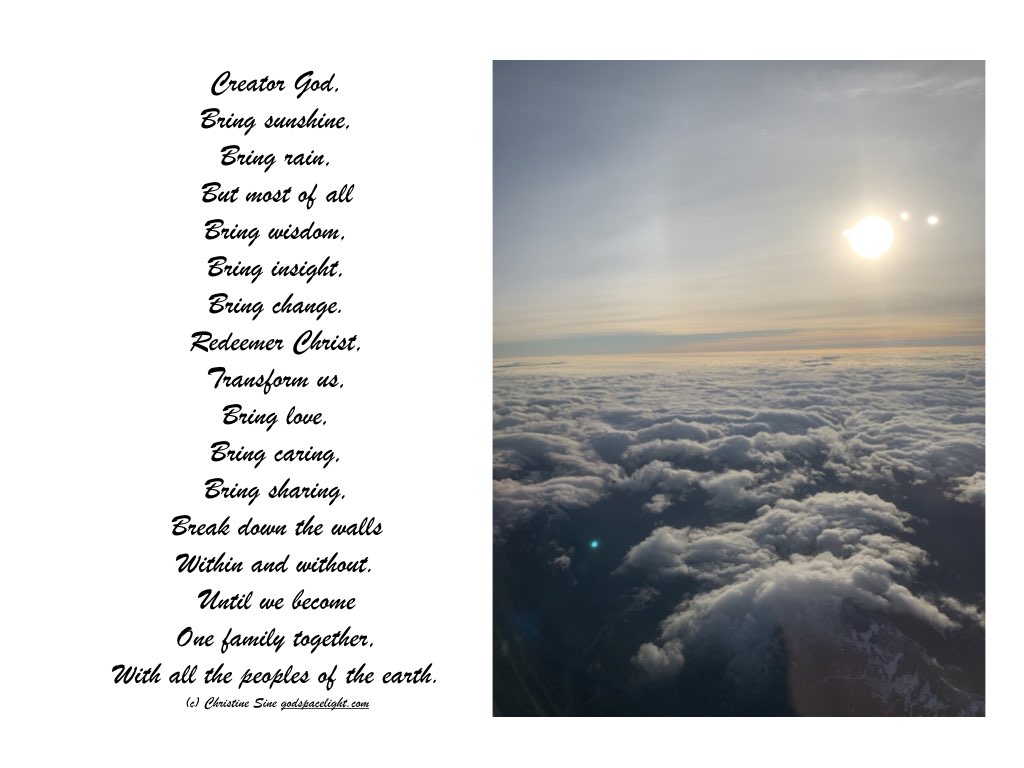by Christine Sine
The last couple of days have been a real struggle for me. I have prayed, I have repented and at times I have been in tears. What on earth is going on you might ask? Has she strayed from the straight and narrow? No! At least not in the usual way we think of this.
I am however weighed down by the news and a deep sense of the evil that exists in our world and the feeling that I am a part of it… and I want to turn away from the pain.
First there is the ongoing saga of the U.S. shutdown. Now at an end thank goodness, at least for the moment. So many lives scarred and disrupted by it.
Then someone reminded me that many of the migrants the US Mexican wall is meant to keep out are displaced and in poverty because of the deliberate destabilization caused in their countries by past US governments. Something else to cause me pain.
January 26th was Australia Day and brought with it another wave of pain. Reading Michael Frost’s important but devastating article We stole your land, your language and your wages but hey let’s celebrate about how indigenous people in Australia have been treated since white people settled there had me in tears. Knowing that the same has happened here in the U.S. and in many other parts of the world makes my heart ache.
January 27th, was International Day of Commemoration For Victims of the Holocaust. So much pain. So much suffering and as one person commented How could a Christian nation do this?
It is easy for all of us to turn a blind eye to to the pain and disruption in peoples’ lives. It overwhelms us and we are afraid that it will consume us if we dwell in the midst of it for too long.
Reaching for Solace
Fortunately there is a way to cope that allows us to confront the pain without being overwhelmed by it. The word David Whyte uses in his book Consolations David Whyte is solace. He is talking about the need for solace after the loss of loved ones, but it seems to me that we also need solace when we are confronted with the kinds of situations I mentioned above.
Confronting this kind of pain makes us feel we have lost a loved one – maybe it is a beloved viewpoint about the goodness of our culture, or of the “Christian” heritage that shaped it. Whenever we confront the reality I found his words really spoke to my heart.
Solace is what we must look for when the mind cannot bear the pain, the loss or the suffering that eventually touches every life and every endeavor…. Solace is found in allowing the body’s innate wisdom to come to the fore…. (and letting it lead us), when the mind cannot bear what it is seeing or hearing, to the bird-song in the trees above our heads, even as we are being told of a death, each note and essence of morning and of mourning; of the current of a life moving on, but somehow, also, and most beautifully, caring, bearing and even celebrating the life we have just lost.
Solace is defined as comfort or consolation in a time of distress or sadness. We need it when we lose a loved one or are devastated by illness but we also need it when we are confronted by the societal atrocities of our cultures, because it is only when we have felt comfort and consolation that we are able to move forward and act not just with repentance but also with reconciliation and sometimes with reparation.
Despair leads us to darkness, solace pulls us out into the light where we can hear the bird song and relish the beauty of the sunrise, and be reenergized to respond.
David Whyte goes on to say:
To look for solace is to learn to ask fiercer and more exquisitely pointed questions, questions that reshape our identities and our bodies and our relation to others. Standing in loss but not overwhelmed by it, we become useful and generous and compassionate and even amusing companions for others.
Solace allows us to ask fierce questions, direct questions that are more than fluff and mild sympathy, without burning us out — uncomfortable questions — what can I do? How can I respond? What do I need to give up to make this response?
One of my friends started tithing to the local Native American tribe because of the hard questions he has been forced to confront. Another started working with families in Central America to help them find economic and educational stability in their still unstable country.
I am still discerning what response God is asking of me, but I know that in order to go deeper into God I will need to make a response. In the mean time I have written a prayer/poem that I know will keep me on track.
Shalom maker
Bringer of peace
through unexpected paths.
Rabble rouser,
Lover of the unwashed,
Companion of sinners,
Friend of the poor.
Shalom maker
Bringer of costly peace
that demands our lives.
Peace not through violence
but through sacrifice
Death to self.
Life for others.
Shalom maker,
Transform us,
Renew us, resurrect us,
Until we all become
one family together,
from all the nations of the world.
I ask you too to prayerfully look at the unsettling news that you have read in the last few days and ask yourself what response God might ask of you to.
By Jenneth Graser —
Wisdom from the Wounds of History – the Holocaust
A couple of years ago, we as a family were going through a very difficult time and I became drawn to reading about the Holocaust. There was urgency within me to discover all I could about both the atrocity and bravery of such a time. Somehow by witnessing for myself through the books I read, interviews and films I watched, I felt I could somehow be present in spirit those many years ago in some way, and receive wisdom from the voices of the martyrs and survivors. People, individuals with names, unique people, haunted by a ghost of numbers tattooed on the skin.
I read and read and would like to share some of my experiences, thoughts and questions from out of this time with you. A stirring grew in my soul to journey with the Jews, the outcasts, misfits, prisoners, gypsies, prostitutes, children, men and women and the “incurably sick”, all of whom were subjected to unmentionable horrors.
How easy it is to observe what is wrong in others. But when I spent many hours exposing to myself the historic wounds of the Holocaust, it made me see that we must be brave to look at ourselves with honest eyes too. It increased in me a desire to grow in empathy, understanding and forgiveness.
One of the books which deeply impacted me was Sarah Helm’s “If This Is a Woman: Inside Ravensbruck – Hitler’s Concentration Camp for Women”. A thick book with incredible overarching detail, I was taken aback by the stance of the writer. She seemed to be able to portray this time from a bird’s eye view both compassionately and objectively, from the vantage points of the persecuted and the persecutors, exposing Ravensbruck for it to be seen, and never forgotten.
I came away from this time with many questions. As much as you would imagine my fixation on reading about the Holocaust could have caused me to become depressed and heavy, yet it gave me something I am truly grateful to have received. I didn’t feel the need to understand everything, but observing it helped me to somehow put into perspective the painful situation we were experiencing.
Some questions I pondered from out of this time:
What causes one person to dehumanise another?
What inside of a person rises to protect another person (known or unknown to them) even at the risk of their own life?
What causes someone else to commit acts of brutality and violence and then justify it?
How can a human heart be capable of such evil?
What am I capable of?
I feel that I was able to read and share these experiences with God and felt Him speaking into my spirit throughout this time.
As Corrie ten Boom says (a survivor of Ravensbruck):
“Memories are the key not to the past, but to the future.”
And as Dietrick Bonhoeffer says (a German pastor, theologian and anti-Nazi dissident, executed 9 April 1945):
“God loves human beings. God loves the world. Not an ideal human, but human beings as they are; not an ideal world, but the real world. What we find repulsive in their opposition to God, what we shrink back from with pain and hostility…this is for God the ground of unfathomable love.”
Let us take this mystery to God in the certainty that one day,
“…at the name of Jesus every knee should bow,
in heaven and on earth and under the earth,
and every tongue acknowledge that Jesus Christ is Lord,
to the glory of God the Father.” Philippians 2:10-11
And that when we cannot in our human capacity understand how the Holocaust could have ever come to be, we can look at the cross and wonder how that could ever come to be as well. That the love Jesus poured out for us there ultimately triumphs over all evil and death. And let us take to heart the truth we live by, that death has lost its sting, while weeping with those who weep and mourning with those who mourn.
How can we share in Christ’s sufferings and help alleviate the suffering of others? Let us take some time in silence today remembering what has gone before. When we see photographs of the piles of shoes that were left behind, let us remember, the faces and names of the people who wore them. Let us not forget. And when we sit with God in the silence, let us allow a greater compassion to rise.
A list of some of the books I have read on the Holocaust:
If This Is a Woman: Inside Ravensbruck – Hitler’s Concentration Camp for Women by Sarah Helm
The Words to Remember It: Memoirs of Child Holocaust Survivors by Sydney Child Holocaust Survivors Group
A Thousand Shall Fall: The Electrifying Story of a Soldier and His Family Who Dared to Practice Their Faith in Hitler’s Germany by Susi Hasel Mundy, Maylan Schurch
I Am Fifteen—and I Don’t Want To Die by Christine Arnothy
The Diary of Anne Frank
Holocaust by Angela Gluck Wood
I Have Lived a Thousand Years by Livia E. Bitton-Jackson
In My Hands: Memories of a Holocaust Rescuer by Irene Gut Opdyke, Jennifer Armstrong
The Hiding Place: The Triumphant True Story of Corrie Ten Boom by Corrie ten Boom, John Sherrill, Elizabeth Sherrill
I recommend watching interviews and testimonies on YouTube of the Holocaust survivors.
By Lilly Lewin
At the beginning of the January, I saw a great quote by Henri Nouwen on someone’s Instagram feed. I asked the person who posted the quote what book she found this in, and she said
You are the Beloved: Daily Meditations for Spiritual Living by Henri Nouwen compiled and edited by Gabrielle Earnshaw.
Since I was looking for a new devotional for the new year, and since I knew I was heading to the abbey for my silent retreat, I ordered the book on Amazon. It’s a great daily devotional with passages from many of Nouwen’s books. While at the Abbey, God used this new book to open an old book for me in a powerful new way.
“Self rejection is the greatest enemy of the spiritual life because it contradicts the sacred voice that calls us the “BELOVED.” Being the Beloved constitutes the core truth of our existence…. “Henri Nouwen
in Life of the Beloved.
I was already processing how much time I spend comparing myself and criticizing myself and this quote leaped off the page! I went down to the the Abbey library, that still has a wonderful card catalogue, the kind with real cards, and found Nouwen’s book Life of the Beloved.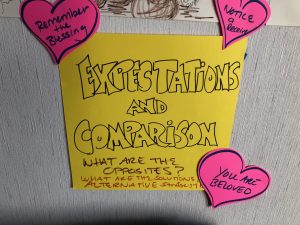
It is the book that is impacting me the most as I begin 2019.
If you’ve read it before, I encourage you to read it again, and if you’ve never read it, pick it up!
Nouwen wrote the book for a dear friend who didn’t have faith in Jesus yet. The friend had asked Henri to write a book that would help him and his friends know about the love of Jesus and the faith he saw in Nouwen. It’s a short book, but powerful! It’s divided into three parts:
Being Beloved
Becoming Beloved
Living as the Beloved.
There is so much in those short chapters that changed my heart during the course of my week at the abbey and in the days since I’ve been back home. But I’m noticing just how hard it is to stay in the BELOVED zone. I’m finding that is very easy for me to go from “I am the Beloved of God” to “I’m no good, I’m behind, I’m not doing enough, those people or that person is doing so much more or so much better than I am”…..The Comparison and Criticism Trap!
So how do we put living as the BELOVED into Practice?
How do we really live into, and as, the BELOVED?
I asked myself what makes me feel loved?
What does it take for me, for my heart, to actually receive LOVE?
What does it take for me to actually believe that I am the BELOVED of God?
WHAT THINGS HELP YOU KNOW THAT YOU ARE LOVED? THAT YOU ARE THE BELOVED? Make a List
For me, it’s often simple things like
A song on the radio or in a store that reminds me
A cardinal in my yard
Fresh snowfall
Sunshine through the clouds after several great days
A text from a friend that sends me a boost of encouragement out of the blue
I’ve started keeping a list in my journal to remind me…
I’ve also put out visual reminders to help me remember that I am BELOVED!
I have a GIFT BAG by my sink that i got at the dollar store.
It has a big heart on it and I wrote: YOU ARE THE BELOVED on one side and
I AM THE BELOVED on the other, so everyone can read it depending upon which side of the kitchen island they are on!
It’s a great visual reminder while i’m dong in dishes.
I am using my LOVE MUG again. I think I’ve talked about this before. I found a couple of mugs during Valentine’s last year that have the word “LOVE” on them. I use them for my morning coffee to drink in the LOVE of God each day! And since Valentine’s Day is coming up, it should be easy to find a mug at your local shop, even the dollar store has them!
I also put up a heart on my bathroom mirror to remind me when I’m brushing my teeth!
WHAT VISUAL REMINDERS will Help you remember that you are BELOVED?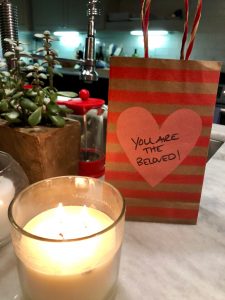
TIME with GOD
In his book, Henri Nouwen suggests to his friend that he take 30 minutes a day to practice being in God’s love. To take half an hour sitting with God, BEING THE BELOVED!
That’s hard. I’m working on Practicing this for 15 minutes a day. Sometimes even 15 minutes is hard if my brain is filled with TO DO lists a mile long!
Today, I lit a candle to help me focus.
I set a timer on my phone for 15 minutes.
I made a “brain drain” list of all the things I have to do so that they could be on paper and not floating around in my head”
I put a gift box on the table in front of me to visually remind me that I am a gift and that God’s love is a gift to me!
I sat with my hands open to receive the love of Jesus and asked Him to flood me with His love!
WHAT else would help you receive the GIFT OF BELOVEDNESS?
One year a friend gave me some wonderful hand lotion that I used during my annual silent retreat. That year was very emotional and God did a lot of inner healing work. That smell still reminds me of that heating time.
Is there a scent that brings you healing? A scent that might connect you with being loved or feeling loved?
Find a candle or an oil or lotion to use to remind you that you are the BELOVED. Or perhaps it’s tactile.
What about a Blanket or a big sweater (jumper)?
Using a blanket to wrap around my shoulders as I stop and pray and pause to receive the love of God. The physical touch of the blanket or sweater to give the physical touch of God’s love.
WHAT else would help you receive the GIFT OF BELOVEDNESS?
What about creating something in art or poetry? or planting bulbs and watching them bloom?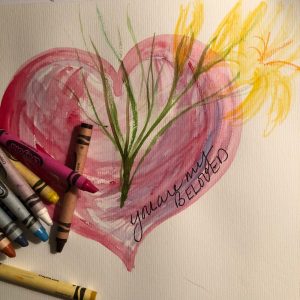
I want more and more to live as the BELOVED. I want to grow in this love so I can love others rather than compare myself with them.
Nouwen says that rejection, comparison and competition are not telling us the truth about ourselves. the Truth is that we are all children of God. We’re are all God’s BELOVED from eternity and through all eternity….held safe in an everlasting embrace! page 49 Life of the Beloved.
A Prayer for us today:
Remember today that you are Beloved!
Receive that!
Live into that.
Stop for a few minutes
Close your eyes
Open your hands
Take a deep breath
Breathe in Love
Breathe out fear
Breathe in Belovedness
Breathe out self doubt
Breathe in love for the unique creation you are
Breathe out comparison
Breathe in Love
Breathe out Hate of self and others
Breathe in Your Belovedness
Believe
Remember
Rest in this great Love.
You are Loved! “You are my Beloved, and on you my favor rests!” God
Note: As an Amazon Affiliate we receive a small amount for purchases made through the links in this post. Thank you for helping to support the work of Godspace in this way.
By Jenneth Graser —
Last week being 17 January 2019 and also my birthday, I was drawn to a particular picture quote to post to Mystic Prayers (a Facebook community I manage). A man walks along a street, his breath hangs in the frosty air. Everything looks so ordinary, the passing of life in the living of it. But the sun is catching his breath in such a way that it makes the spiritual world look visible. And the quote attached to this picture? “Sometimes I need only to stand wherever I am to be blessed”.
I did not know it would be the day my favourite poet mentor Mary Oliver would pass away. And that it would be her words accompanying me yesterday like a benediction. I feel it was a farewell message from this beautiful woman for all of us, that it is precisely where we stand at the present moment that we will find the breath of God, breathing in and through us. Today, not another day. Now, not some time in the future when everything is perfect.
Last year my husband Karl gifted me with her compilation of poetry “Devotions” for my birthday. This year on my birthday she left her heart’s wisdom with me and I will always remember.
I wrote a poem ~ For Mary Oliver ~ who leaves with us a legacy of love in words and who will always speak long after she has now passed through gates of glory.
~ For Mary Oliver ~
You teach us to be still,
to walk unadorned with the trees
in the silence of friendship.
To stop and watch with eyes
wide awake, open to see.
You teach us to listen
to every small and living thing
made glorious through observation.
You teach us the thrill
of the rhythmic beating of our hearts
in our chests
telling us every day
I am alive, I am alive.
You teach us that death
is a mere walking through
with the companions like stars you have made
now known to you,
like words on a page
that bloom before our very eyes.
Flowers scatter on a grave…
and how the wind takes the seeds
to the light, to the light!
by Christine Sine
Lent is still a couple of months away. It doesn’t begin until March 6th, but I am already thinking about how I will practice it and longing for the self reflection and renewal that it brings.
This year our Godspace theme will be Breaking Down Walls. I am not just thinking of the controversy about the border wall on the U.S/Mexican border when I choose this topic. All of us have walls in our lives. Walls that separate us from the one true God, from each other and from God’s creation. Jesus is the one who is able to break down the walls and open the barriers that keep us closed off. Lent is a great season of preparation for destruction of the barriers that separate us.
What walls do you still need to break down:
- within yourself to find inner healing from past hurts and scars;
- in your attitude towards others to bring reconciliation and unity;
- in your concern for creation to become the best steward of God’s good earth that you could possibly be;
- in your relationship to God and your desire for new depths of intimacy with your creator.
What could a 21st century desert experience look like for you this year?
What preparation could you make now so that Lent becomes a powerful season of renewal and transformation, a season for breaking down walls? I am already working on my Lenten garden and it is helping me to think about the walls that I need to work on breaking down during this upcoming season.
We are still in the season of Epiphany. One of the important celebrations of this season is the coming of the Magi and part of what I love about these foreigners from the East is that once they encountered Jesus, they went home by another way. Their encounter with the baby Jesus changed them forever. May our encounters with Jesus also change us irrevocably so that we too find another way to live in our troubled world.
An Invitation to Join Us.
This is your invitation to get ready with us for this season of self examination and liberation from the bondages of slavery. Come into the desert with Jesus as he resists the temptations of hunger, power and wealth. Come with the children of Israel as they are led into the wilderness to find the freedom of following no other God but YAHWEH. Come expecting walls to be broken down and new pathways to be forged so that together we can celebrate the wonder of Jesus resurrection and invitation to be part of a global family of unity and acceptance.
Would you like to write a Lenten post for Godspace? If you are interested read through the guidelines here . Contact us with your interest and suggestions for your post.
By Allison de Laveaga —
Play. For kids it comes easily. But for adults it’s not something we do that often. When was the last time you played a game, acted in a skit or picked up some crayons?
It had been a long time since I had done any of these things—until I attended a contemplative retreat a few months ago. But that’s exactly what we did at the retreat. We played, we laughed, we relaxed—and something sacred happened.
Going into the retreat I thought it would be serious and sober, full of challenging readings and talks. I thought we would be studying spiritual classics—maybe excerpts from St. Augustine or St. Francis. I expected an intellectual exercise. Instead, the first night of the retreat, we were asked to bring blankets and a pillow to our meeting room. There, snuggled beneath our blankets, the facilitators offered a Psalm and some opening comments and then read children’s picture books. At first I was surprised and disappointed that we were reading these simple stories. What was this about? Slowly though, I began to relax into the rhythm of the words and I almost fell asleep. I shuffled off to my bunk room in a state of peace, feeling like I was five again.
The next day we gathered and read Psalm 104, a Psalm about God as creator. We listened to Fernando Ortega’s beautiful rendition of the song and then we were paired up, each given a section of the long Psalm to “act out” with hand motions and movement. It seems a bit contrived now describing this, but the activity felt freeing and creative. I wasn’t being asked to analyze anything, as we so often are in our culture, particularly church culture, but I was invited to experience it with my body. Then we were sent off for the afternoon to spend time alone in nature.
“I can’t believe it,” I told the facilitator I met with for a one-on-one spiritual direction session that afternoon. “I’ve left all my worries behind. I’m so relaxed.”
Later that day, waiting for the evening session, I spent some time at the art station the facilitators had set up. I used to love to draw as a child but seldom draw anymore. I picked up some pastels and sketched the beautiful view outside the window—a slice of Tomales Bay framed by brown hills. I thought of how another retreatant had told me he’d seen a shooting star the night before. I made a little star and smudged the pastel to make a streak. Someone in the adjoining chapel started to play music and sing. Slowly our group filled up the chapel and joined in.
A woman who writes about contemplative retreats says that the point is to attend to God. “We open ourselves to God’s grace and receive it with gratitude in whatever form it may appear,” says Jane Vennard. I didn’t have many profound thoughts about God during my retreat. I sensed a few nudges that may take time to sift through. Mostly, though, I did experience God’s grace in the gifts he gave me of both rest and play.
Coming home from the retreat I wondered how I could incorporate more “play” into my daily life. When my kids were little, this was easy. Days were filled with playdoh on the kitchen table, games of Candyland sprawled out on the family room floor and experiments to see which matchbox cars went down the hallway fastest. We had never-ending play. I realize now I really came alive during that play. Now I need to be intentional about play.
Here are some of the questions I asked myself:
How do I set up new patterns of play at home?
What are the boundaries between work and play?
How do I encourage more play in my family?
It’s been several months since the retreat now. I’ve realized that establishing new patterns of play is not easy. At home there is always laundry to be done, cars to be fixed or bills to pay. Our online worlds also seem to constantly demand our attention in both draining and life-giving ways. I’ve realized that becoming more playful is a discipline, just like establishing a meditation practice or exercising regularly.
I’ve had a few small successes. Several nights after dinner I’ve made the intention not to sit at my computer and instead invite my husband to play our favorite card game, Spite and Malice. There was a season when we played this a lot but then got distracted by more urgent matters.
Another day I decided to make something playful for dinner. I made a trip to the Cheeseboard and sampled several varieties. I bought a sharp Gruyère and creamy Swiss and headed home to wash out the old fondue pot I hadn’t used in years. That night my husband and son were excited to use it, though they both said next time they’d prefer to skip the cheese and indulge in a chocolate fondue instead.
One thing I’ve realized is that play is usually physical and creative. It’s a chance to get out of my cerebral thoughts and shuffle a deck of cards, throw a ball to the dog or glue some leaves together for a holiday decoration. Our world is so troubled and serious. We need tactile experiences that remind us of our humanity.
Play also focuses more on process than finished product, something a bit countercultural these days. Sure you want to win a game or create a nice drawing, but the main point is letting go and enjoying the sensations of the moment. Every creative writing or art teacher knows it can be stifling to focus on product over process. The process is its own reward—the product, if pleasing, is a nice side benefit.
I’m now in the midst of planning a contemplative retreat for others. It’s the first time I’ve done such a thing. I feel an expectation to deliver profound, complex words. Perhaps there’s nothing wrong with that. But I also have to remember to include times of play. I want my retreatants to experience that sort of buoyancy that comes when we release our thoughts for a time and relax into the moment. God does something to restore us and give us hope in those moments. And we all need more hope.
By Jenneth Graser —
Everything we think, has power! Our thoughts create possibilities in our minds and then we act out of those thoughts. Everything we believe is either true or not. And when we believe something that is not true as though it is, we live out of that belief as our reality. We have all experienced the power of our thinking. For example, if bitten by a dog at a young age, we may continue to have anxiety around dogs as an adult believing all dogs to be dangerous or unpredictable, which is not true for all dogs, but certainly feels true if you were the child with such an experience!
Experiences lead to feelings lead to thoughts lead to behaviours. If we become a super sleuth and invite the Holy Spirit into the breadcrumb trail of our feelings and trace back to where they come from, we can experience freedom and healing by inviting his perspective in. Which in turn can lead to, no more unreasonable fear of dogs!
We are formed intrinsically through our culture, geographical location, family upbringing, educational background and circumstances to name a few. And when things happen to us in life, we form opinions about life based upon those experiences, whether good or bad.
Scripture is filled with the promises and truth of God. And Jesus encourages us to come to him as the Way, the Truth and the Life. So we can renew our minds by refreshing ourselves at the waters of the Living Word. We can open our hearts and minds to transform belief patterns that are not serving us well.
Part of this process of renewing our minds is by declaring or affirming truth over ourselves to shift the negative thought patterns we have, often which we are not even aware of. It truly is a process of transformation – be transformed by the renewing of your mind. Romans 12:2
At the beginning of this year, I started journaling and began to write out a list of affirmations to declare into 2019. I share this with you here and encourage you to write out your own list of affirmations and declarations and say these over your life and situation, knowing that as you say them regularly, you are renewing your mind. Use the Bible as a foundation for your declarations.
As we grow in this transforming process, I believe we will experience a shift in our thinking patterns and enter into greater freedom as a result! It is something I wish to embrace and practice. I think the mind needs some good exercise in thinking just the way I feel my body needs exercise to feel good. All a work in progress!
Some of the books and resources available on the power of our thinking:
Joyce Meyer – The Battlefield of the Mind
Steve & Wendy Backlund – Igniting Hope
Dr Caroline Leaf – Switch on your brain
~ 101 Affirmations for the New Year ~
- I live out of perfect peace
- There is always an option for me
- I can choose
- I do not live out of my past
- I am open to change
- I tap into the life giving Spirit
- I am one with the Father
- My creativity is expressed
- I am not held back
- I can change my mind
- My perspectives can shift
- I enter into every opportunity God opens for me
- I am provided for
- Abundance is my nature
- I am a generous person
- I like to give to others
- I look after myself well
- I love being with God
- Prayer is a great joy to me
- I hear from God
- I am created for freedom
- There is always a way forward
- I am not perfect and that is OK
- I embrace myself with unconditional love
- I am constantly evolving
- I let go of my clutter
- I am excited to try new things
- I respond to the inspiration of the Spirit
- I hear from God in my dreams
- I enjoy the simple pleasures of life
- I live in harmony with others
- Even my enemies live at peace with me
- I forgive all past hurt and offenses
- My mind is clear at all times
- I hear God’s voice and know what to do
- God is leading me at all times
- I let my yes be yes, and my no, no
- God uses every negative as something that can be turned around for my good
- A miracle is possible in every moment
- I am a powerful person
- What I say has value
- I know when to speak and when to be silent
- I am comfortable in my body
- I forgive myself and others with unconditional love
- I have fabulous ideas
- I am a good listener
- I do not compare myself with others
- My gifts are freely shared
- My talents have plenty of room for expression
- I am amply provided for
- I am protected
- I thrive and flourish
- I sleep deeply and well
- My relationships are a blessing
- I do not doubt my abilities
- I am willing to grow
- I have a teachable spirit
- I draw deeply from the wells of salvation
- I drink of the Living Word
- I love reading the Bible
- I read the Bible for intimacy not productivity
- I am treasured by God
- I do not perform for love
- I am loved as I am
- I rest in the goodness of God
- My life is in God’s timing
- God is able to lead me well
- I enjoy resting from work
- I like to make time for silence
- I make time for nature everyday
- I listen to music I love
- I do nothing out of obligation
- I am not easily manipulated
- I discern the way forward
- I am growing in wisdom
- I make use of resources for spiritual growth
- I love to encourage others
- There is more than enough time for all I need to do
- I am filled with increasing energy and good health
- I love to laugh loud and joyfully
- The best is yet to come
- The past does not determine the future
- I have a healthy and hope-filled outlook
- I trust in God’s leadership abilities
- God desires only good for me
- I am a good parent
- I do not expect perfection of myself or others
- I forgive quickly, and dwell in grace
- I choose forgiveness and release all past resentments
- I have a wonderful marriage
- I have a beautiful relationship with my children
- I am a joyful person
- Everything I do, flows out of rest
- I am intrinsically linked into the Vine and receive all I need from God’s abundant supply
- I am open to correction
- Every door of opportunity opens for me at just the right time
- I remain calm in challenging situations
- I listen to my feelings
- I am close to God
- God loves me as his very own child
- I believe the promises of God
NOTE: As an Amazon Affiliate we receive a small amount for purchases made through appropriate links. Thank you for helping us to support the ongoing work of Godspace in this way.
As an Amazon Associate, I receive a small amount for purchases made through appropriate links.
Thank you for supporting Godspace in this way.
When referencing or quoting Godspace Light, please be sure to include the Author (Christine Sine unless otherwise noted), the Title of the article or resource, the Source link where appropriate, and ©Godspacelight.com. Thank you!

